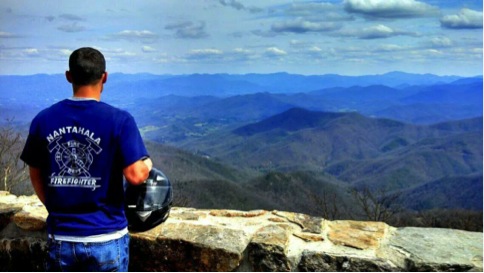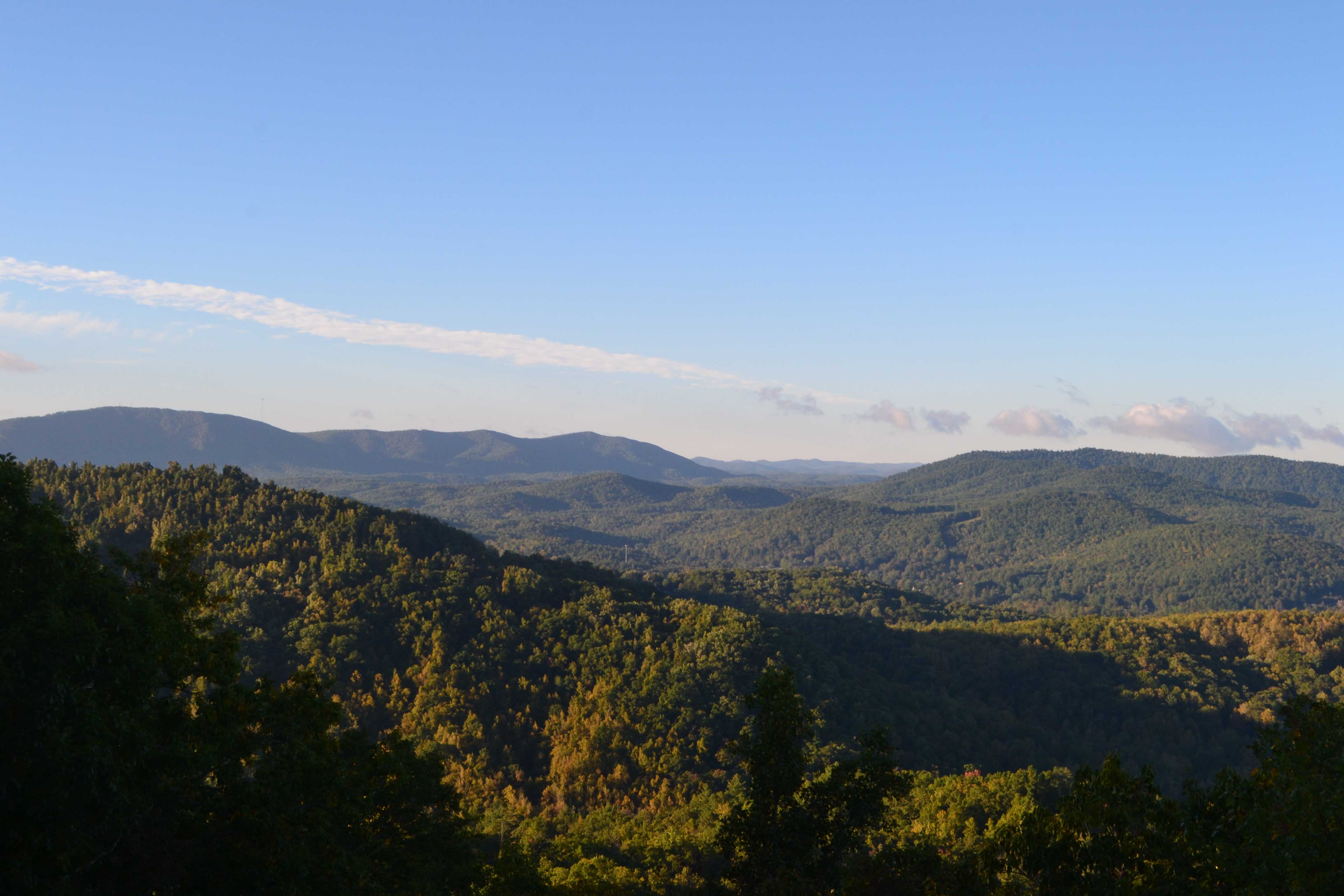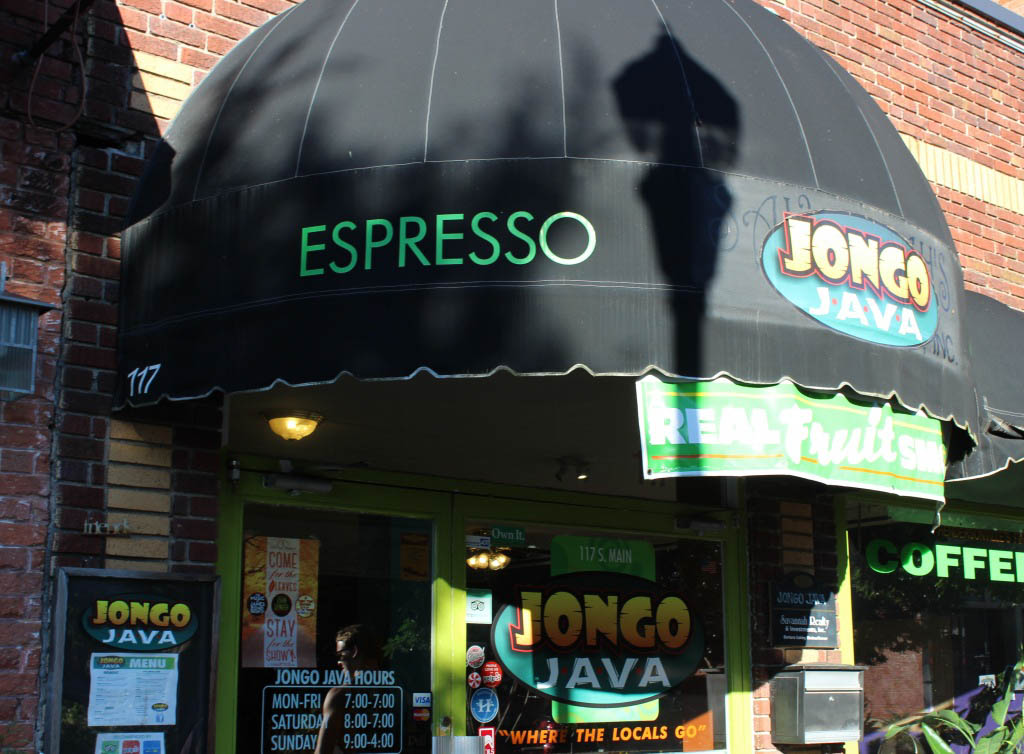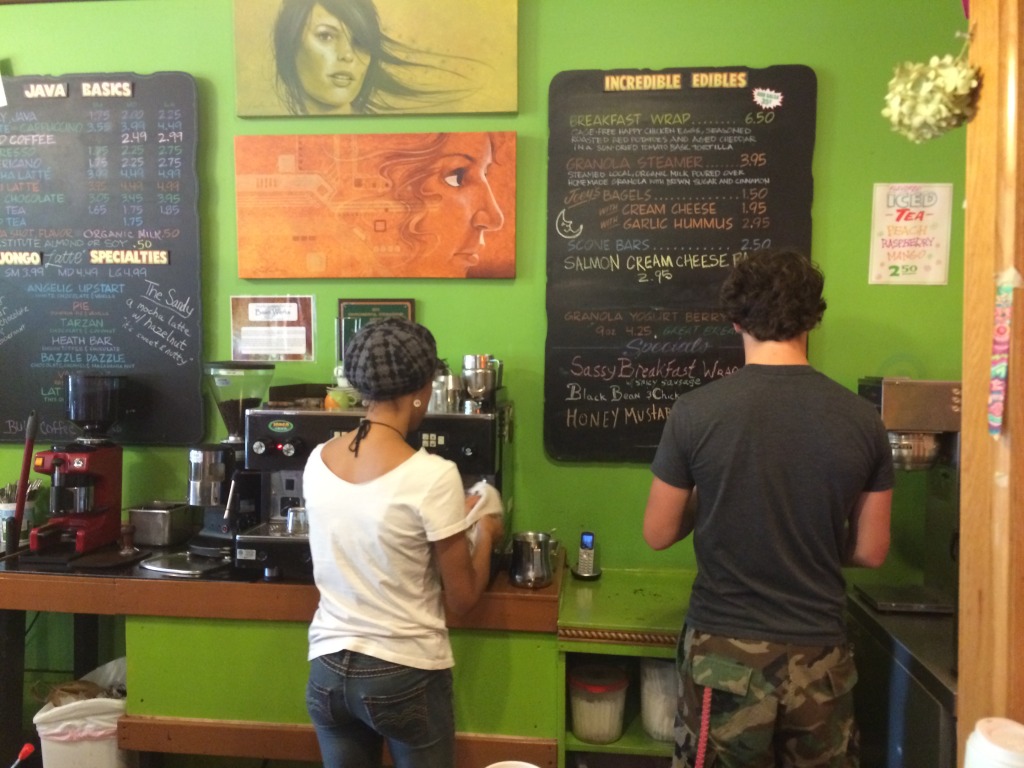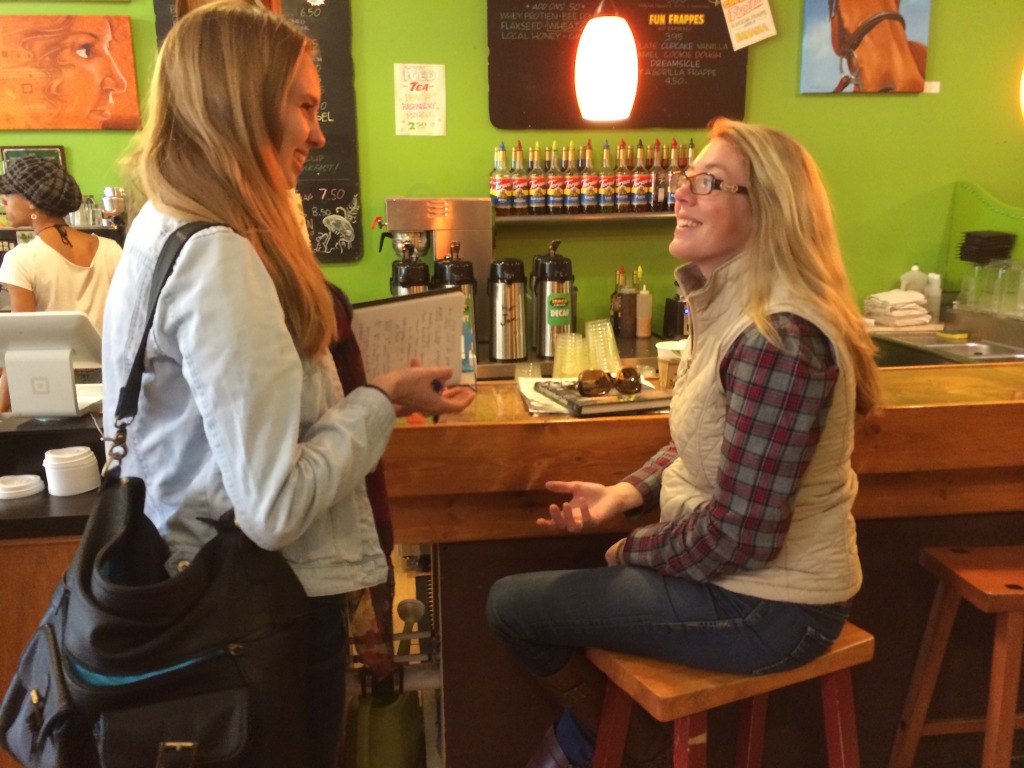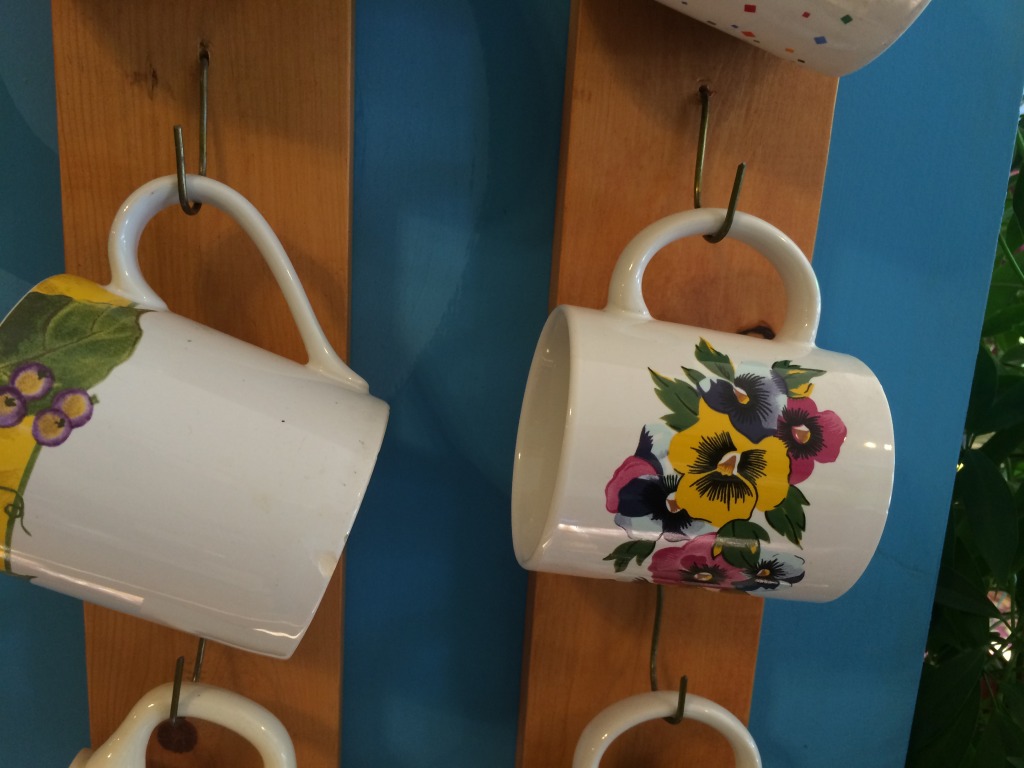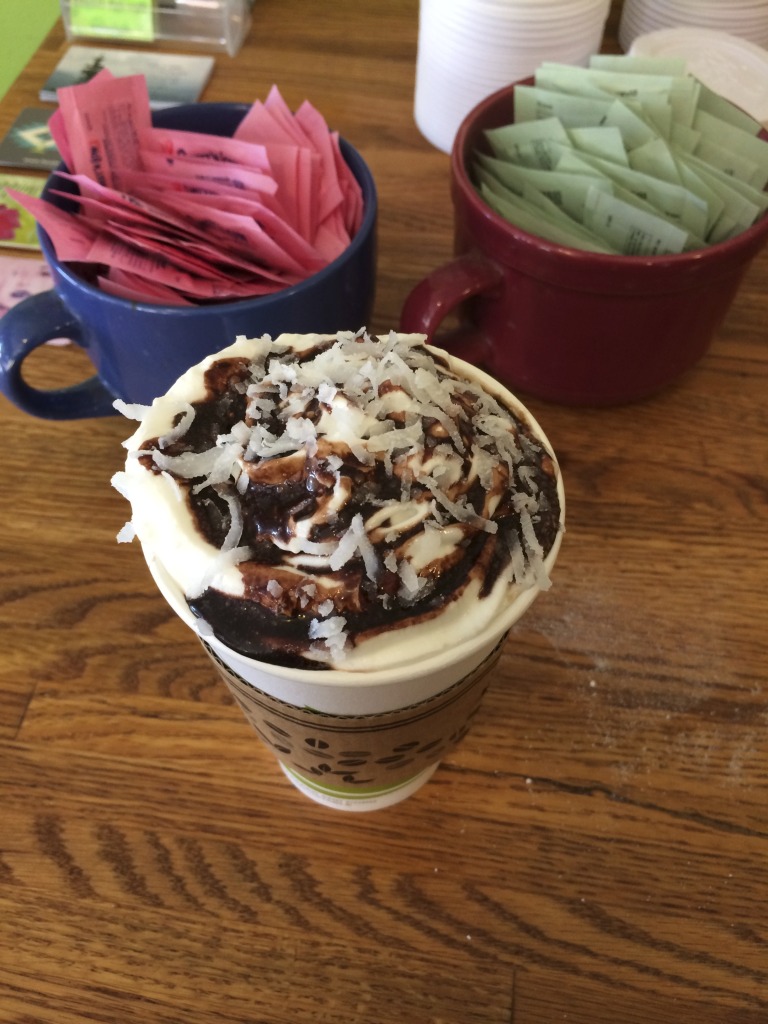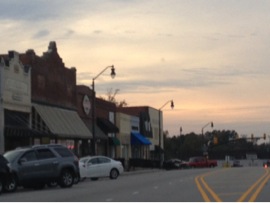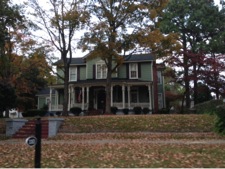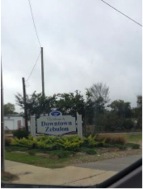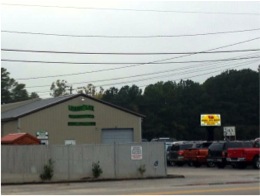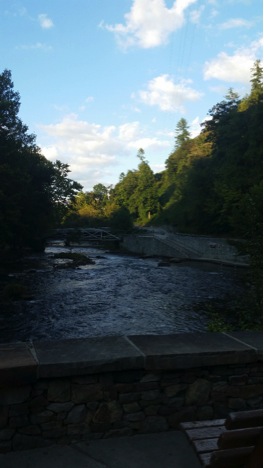Searching for a Souvenir
By Nicole Esplin, 2013
I’m still a child at heart. When I was younger, I was a die-hard souvenir collector and although I don’t have an organized stash anymore, if you look around my room you’ll notice mementos from trips scattered about. There’s a starfish necklace from St. Thomas, my name on a piece of rice from Virginia, skiing medals from Colorado and a candle from Asheville. Naturally, I started panicking when I realized we were already at our last stop in Brevard and all I had to bring home was some honey and pumpkin bread, which would likely not make it past Hickory on the ride back to Elon.
After eating a quick lunch and browsing a few stores, the itch for something real and truly special from this trip set in. I began scouring the stores and asking the owners about their businesses, hoping for some kind of story to go with my souvenir. I wasn’t looking for an airport t-shirt. Anyone can pick up a “Washington D.C.” t-shirt at the airport on their way home. I was looking for something to remember Brevard with.
Ten years ago, I would have happily settled for one of the stuffed white squirrels in the tourist-filled “White Squirrel Shop,” but I veered towards the smaller stores, still looking for that inspiration to buy something for more than its monetary value. Brevard reminds me of a smaller Asheville; less quirky but more homey and community focused. I wandered into a little hippie shop that sold local fine arts, crafts, jewelry and other trinkets. The sign out front said “Local Color,” and I felt like I was at home. A tall man with long brown hair and a hawaiian-style shirt stood behind the register and welcomed me, offering his assistance. He opened the shop 4 years ago after moving to Brevard to escape the “urban sprawl.” His name is Paul, and his wife’s name is Pauline. Here’s my story.
As I browsed the store, Paul described exactly how he ended up in Brevard at this little shop.
“I’ve lived in Brevard for 18 years,” Paul said. “I grew up outside Chicago and it was pretty busy. I moved to Raleigh in ’86 and lived there for 3 years before moving to Pittsboro, right near [Jordan] lake.”
Paul stayed in Pittsboro until the town announced that they would make Highway 64 a 4-lane expressway right past his home. So, Paul did what any righteous North Carolinian would do and drove down Highway 64 until he found the right town to settle in.
“I didn’t want to see Pittsboro change from the highway,” Paul said. “I fell in love with Brevard right away.”
Shortly after moving to Brevard, Paul met his wife, Pauline, who was working at another store down the street from Local Color. After Paul lost his job in the building supply industry, he decided to help Pauline open her own shop, which is now Local Color.
“There’s about 100 artists and 70 are from the area,” Paul said. “We have a mixture of some resale areas and some new items from the area. “
I found my souvenir tucked in a corner. It’s a simple wooden plaque with a sailboat and the words “You can’t change the wind, but you can adjust the sails,” painted on. The painting spoke to me, and it matched the colors of my room. But more so Paul’s story spoke to me, and I knew that this store was where I was going to buy my trip memento. Not because I couldn’t find anything else I liked more at the next store, but because of Paul’s association with Highway 64 and his free spirit to uproot his home and move somewhere simpler. The mountains are a simple place, a place where people move to get away from the congestion of city life in central N.C. while maintaining close friendships with community members. I couldn’t help but smile as we walked back to the car and I felt my wooden plaque weighing down my purse. I had found a souvenir that was more than just an artist’s work. The journey had given me insight into the town of Brevard itself.
The Meaning of Community
By Casey Brown, 2013
I know what it’s like to have a community you’re proud of. I was raised in the Boston area, which instills pride in its residents from birth. We’re proud of our rich history, of our distinct culture, our sports teams. We stand by and defend our way of life, much like the patriots did when we were still under English rule. But I don’t think I’ve realized how deeply pride can move you until my visit to Brevard.
When Mags and I ate at the Phoenix restaurant, it was all about celebrating what’s local. They proudly boast that 90% of their menu comes from local farmers and markets. The other 10% is seafood from the coast. The walls are coated in art from local artists and they are all for sale. Bobby, the mariachi guitarist we met in downtown Brevard, was proud to be in the town. He was an avid supporter for his friend Kim Provost’s upcoming city council campaign and while he was moving to Chicago, he couldn’t wait to return to his town in Brevard. Kim Provost, the owner of Hunters and Gatherers, has used her store to promote American-made products. She supports her community and now is giving back to it by running for office.
In Brevard, the people are proud of their little city. But more than that, they are willing to preserve it. Their pride motivates them to do something more productive, to give back to the city that has given them a life, a family, a home. It’s an admirable sense of purpose the people of Brevard seem to feel about their community.
Leaving Brevard after witnessing this affection for home, it made me really think about my future. I want to move to Los Angeles after graduation, but spending time in the mountains made me really rethink that decision. Did I really want to move to a city where I’d become a faceless member of a community so vast, you’d never really be recognized? It’s sort of a depressing thought. I’m still not sure what I’ll do when I have to leave into the real world, but my time in Brevard showed me how important it is to find a community you’re proud of and that if you’re truly proud of a community, you’ll do what you can to give back to it.
Reclaiming My Carolina Roots
By Margaret Bryant, 2013
I am a North Carolina girl. I may not have the sweet southern drawl, with subtle annunciations with which I say sticky, drawn out colloquial phrases that drip slowly like honey. I certainly don’t have a whole lot of southern pride because history and politics below the Mason Dixon line are almost always messy, but nonetheless, I am from the South. I have struggled with North Carolina over the years, often wondering what life would have been like if my Northern and polite, moderately opinionated parents had raised me and my older sister somewhere else. My mother is from New England and my father is from Virginia. After the Highway 64 project and our trip through the mountains, I have been gratefully reminded of why I love the place I have been reluctant to call home for so many years. Growing up, I spent a few weeks of summer at a co-ed summer camp near Brevard. It had been so many years since I have been to that part of North Carolina and I was excited to be back again at such a beautiful time of year.
On the third and final day of our mountain adventure, we planned to pass through Brevard on our way back to Elon. We had a few places as planned stops, but generally, the day had been blocked off as time to explore. We split into groups of two, as we had done many times over the past two days, in order to cover more ground. Casey and I wandered down the main street, in hopes of finding somewhere or someone interesting. We ate at The Phoenix, a local farm-to-table restaurant. During our time in the sleepy town, as most places in the mountains are on a Sunday afternoon, I began to notice a thread that tied place to place on our trip. There is this sense of gratitude at the very core of the local people. After lunch, we explored on foot, stopping in a few shops that looked interesting.
There was a table set up outside the Celestial Mountain Music Store, with a piece of paper with “FREE” scribbled on it in big, block letters. Inside the boxes were vinyl records, exploring a variety of genres. Everything from Christmas Carols to Claude Debussy were covered in dust and stacked carelessly. I dug through the boxes, a few couples passing by, peeking in for a minute or two before continuing on their way. To find records like the ones outside the music store for free is rare. Not only are they considered collectibles at this point, but every apathetic hipster in fake glasses and clothes straight out of Nylon Magazine live for these finds. I took two to add to my family’s collection at home. Not long after, we came across a guitarist from Mariachi group named Bobby. Originally from Mexico, he now splits his time between Chicago and Brevard, he told us a little bit about his life, but mostly emphasized why he loved North Carolina. He talked about how the people care and support one another. To put it in greeting card words, they are all about the local love.
Not long after, we ended up talking with and interviewing Kim Provost, the owner of a store that exclusively sells art and other hand-made items. Everything comes from somewhere in the United States, nothing is mass-produced or a product of a sweatshop assembly line. Hunters and Gatherers, like The Phoenix, supports local, a movement that is not as common as it should be. Kim is also running for city council. When I asked her why she wants to be involved with the politics, she told me something that will probably stay with me for a long time. In her “twenty-four year love affair” (as she calls it), Brevard has treated her well. She has been able to be a prominent member of the community, and the town has taken care of her and her family. She says that now it is time for her to give back and show her gratitude.
I was surprised again and again during our trip by how much successful individuals care for the people who got them where they are now. The endless gratitude that people like Kim and Bobby express is infectious and it reminded me in a humbling way of how I am so lucky to call this state my home. There is a sense of loving humility in Brevard that you just can’t find in a big city. After seeing it so up close, I hope I can take that with me as I travel and explore, eventually returning to the place I am now thankful to call home.
How Chocolate Can Change Your Life
By Hillary Dooley, 2013
Brevard is one of those small mountain towns where you can spend hours exploring and run into people with the most unique stories, and although everyone has a different story about what brought them to Brevard or what has been keeping them there, there is always one thing in common: passion. You can almost feel the passion float through the town as it rustles with the leaves.
One of these people runs a chocolate shop down a small street in the center of Brevard. It sits in the perfect location, right across from the Square Root. After I had finished my lunch there, I ventured across the street to the chocolate shop to satisfy my sweet tooth and take some dessert for the road.
Upon walking in, it is a quiet shop. No one was there to greet us, but we could hear a bustling in the back kitchen area. Pretty soon, a 71-year old man named George walked out ready to take our order. This was the complete opposite of whom I had expected to own a chocolate shop. I was imagining a young mother in her early 30s pursuing her passion and making some money on the side for her three children. But Brevard is unique, and who says a 71-year old man can’t make chocolate?
I stared at all the chocolates, wondering what to get. There was everything imaginable from all kinds of truffles to chocolate covered Oreos and graham crackers, nut clusters, bark, and much more. I spotted several chocolate covered Twinkies in the corner. A smile was painted on each, and a sign reading, “We’re so happy to be back!!!” accompanied them. I decided against the Twinkies, but I taste tested a few truffles and got an assortment of milk chocolate treats.
As we were checking out, we began to talk to George to see how he came about running this place. He said he didn’t set out to make chocolate, but that it accidentally fell upon him. He told us how he used to be a real estate developer and how he gave the building we were standing in to his daughter. She began a restaurant there with her husband. Before long, business was booming, and they had no life. So, they sold the business and kept the building. Next thing George knew, a man and woman walked in from down the street, asking if the building was open for business. They said, “Well, the Lord talked to us and told us to open a business.” When he asked what kind of business, they answered a chocolate shop. And that’s how the chocolate shop came to be.
However, George wasn’t supposed to be the one operating the business. It turns out a week before opening, the Lord told the man and woman to go elsewhere, and George had no choice but to open a few chocolate books and get started himself. He chuckled as he explained to us that it took him a couple months to learn and that he “turned a lot ‘a brown chocolate white” in the process. That was eight years ago, and since then George has been so successful he has been shipping chocolates across the globe to Belgium, Finland, Spain, Japan, Jerusalem, Guatemala, and Germany.
We thanked George for his time and delicious chocolates, and on our way out, he had one piece of advice for us: “You can do anything you set your mind to, but don’t ever trust a Christian.” But after all, George wouldn’t be successful doing what he has come to love if he hadn’t trusted a Christian.


